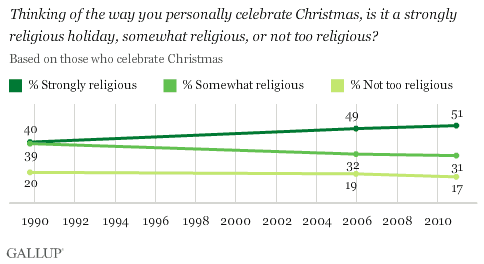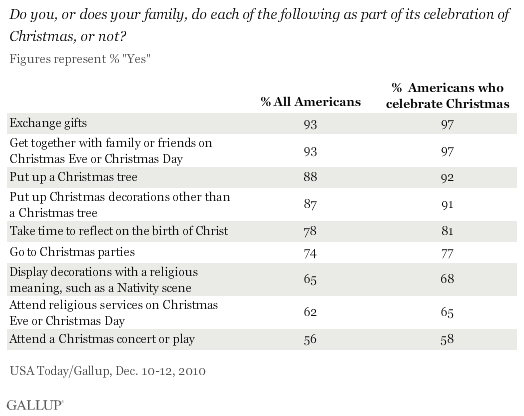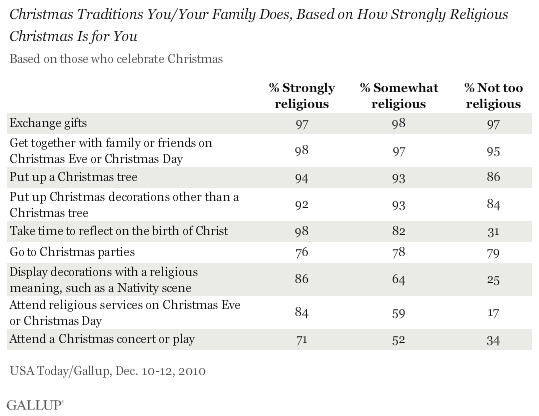PRINCETON, NJ -- Ninety-five percent of Americans celebrate Christmas, and of these, 51% describe the holiday as "strongly religious" for them, continuing an upward trend seen since 1989.

This trend toward greater religious meaning in Christmas is evident even as the percentage of Americans who say they celebrate Christmas has stayed consistent in recent years -- ranging between 93% and 96% in six separate Gallup measurements since 1994.
The poll finds a majority of Americans incorporating specific religious activities or symbols into their holiday celebrations. This includes 62% who attend religious services on Christmas Eve or Christmas Day, 65% who display decorations with a religious meaning, and 78% who take time to reflect on the birth of Christ.
However, Americans are much more likely to engage in secular Christmas traditions such as exchanging gifts (93%), spending time with family and friends on the holiday (93%), and putting up a Christmas tree (88%). The figures are slightly higher among Americans who celebrate Christmas, including exchanging gifts and spending time with family and friends, which are almost universal traditions, at 97%.

Religious traditions are, not surprisingly, more common among those who say the holiday is strongly religious to them. Nearly all members of this group, 98%, say they take time at Christmas to reflect on the birth of Christ. More than 8 in 10 attend religious services on Christmas Eve or Christmas Day, or display religious decorations. But even among those who say Christmas is a strongly religious holiday to them, many of the secular traditions are just as common if not more so than the religious ones.

Generally speaking, those who say Christmas is not too religious a holiday for them are less likely to participate in most of the common traditions. But even those who attach little religious meaning to Christmas are just as likely as those who view Christmas as a religious holiday to exchange gifts, spend time with family and friends on Christmas Eve and Christmas Day, and attend Christmas parties.
Implications
Though it has Christian underpinnings, the Christmas holiday is celebrated nearly universally by Americans, including 80% of non-Christians. Part of the reason for this is Americans' widespread involvement in nonreligious aspects of Christmas, including exchanging gifts and getting together with friends and relatives.
Over the past three decades, the percentage of those who celebrate Christmas and describe it as a "strongly religious" holiday for them has increased. Thus, the religious aspect of the Christmas holiday may be growing in importance; however, Americans are more likely to participate in nonreligious Christmas traditions than in religious ones.
Results for this USA Today/Gallup poll are based on telephone interviews conducted Dec. 10-12, 2010, with a random sample of 1,019 adults, aged 18 and older, living in the continental U.S., selected using random-digit-dial sampling.
For results based on the total sample of national adults, one can say with 95% confidence that the maximum margin of sampling error is ±4 percentage points.
For results based on the total sample of 970 national adults who celebrate Christmas, one can say with 95% confidence that the maximum margin of sampling error is ±4 percentage points.
Interviews are conducted with respondents on landline telephones (for respondents with a landline telephone) and cellular phones (for respondents who are cell phone-only). Each sample includes a minimum quota of 150 cell phone-only respondents and 850 landline respondents, with additional minimum quotas among landline respondents for gender within region. Landline respondents are chosen at random within each household on the basis of which member had the most recent birthday.
Samples are weighted by gender, age, race, education, region, and phone lines. Demographic weighting targets are based on the March 2009 Current Population Survey figures for the aged 18 and older non-institutionalized population living in continental U.S. telephone households. All reported margins of sampling error include the computed design effects for weighting and sample design.
In addition to sampling error, question wording and practical difficulties in conducting surveys can introduce error or bias into the findings of public opinion polls.
View methodology, full question results, and trend data.
For more details on Gallup's polling methodology, visit www.gallup.com.
